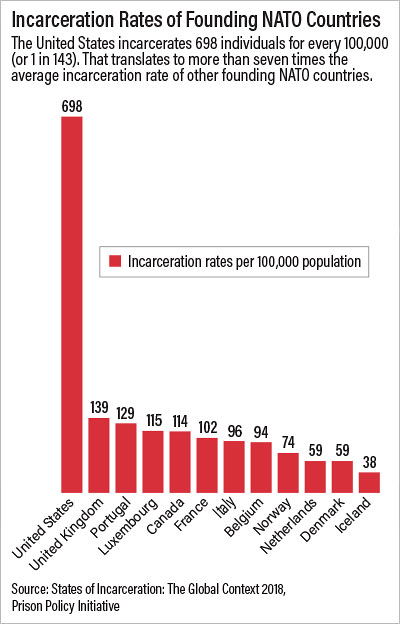First Step Act Is Start Toward Meaningful Prison Reform
Abstract
Congress passes the most ambitious criminal justice and sentencing overhaul in decades, addressing some concerns of individuals with mental illness. Advocates hope reforms will trickle down to state and local prisons.
A bipartisan criminal justice reform bill signed into law late last month includes some provisions beneficial to individuals with behavioral health disorders.
The most ambitious criminal justice and prison sentencing reform in many years, the First Step Act (S 756) aims to cut recidivism and improve federal prison conditions while also reducing mandatory sentences. Prior to the enactment of the First Step Act, it had been several decades since Congress had made significant reforms to federal criminal justice and prison policies.
APA supported several of the provisions that passed, particularly prison staff training on how to handle incidents involving inmates with mental illness. However, APA and other organizations that advocate for mentally ill people are concerned that it falls short of the sweeping overhaul required to address the needs of the more than 2 million individuals with serious mental illness who are cycling in and out of jails and prisons.
“APA members will see some benefit for their patients from this legislation, particularly those who work in the corrections sector or those working with individuals post-release,” said APA President Altha Stewart, M.D., an associate professor of psychiatry and director of the Center for Health in Justice Involved Youth at the University of Tennessee Health Science Center. “These types of systems improvements are very consistent with APA’s work to develop better treatment models for people with mental illness in jails and prisons.” For example, APA joined the Stepping Up initiative, a national effort to reduce the number of individuals with mental illness in county jails, in 2015.

Several years in the making, President Donald Trump embraced the measure last November, and with his support, the bill was approved by the Senate by a bipartisan vote of 87-12 on December 18, followed by a House vote of 358-36 two days later.
“[M]y job is to fight for ALL citizens, even those who have made mistakes,” Trump tweeted, congratulating the Senate for its passage of the historic measure. “This will keep our communities safer and provide hope and a second chance to those who earn it. In addition to everything else, billions of dollars will be saved.”
The new law will do little to address that the United States is out of step with the rest of the developed world regarding incarceration rates. There is one person locked up for every 143 people in the United States, compared with 1 in 1,079 on average in other founding NATO countries, according to the Prison Policy Initiative (see chart).
As a federal law, the First Step Act applies only to the 225,000 individuals in federal prisons and jails, only a very small fraction—about 10 percent—of all those incarcerated in the United States. The majority are locked up in state prisons and local jails, more than 1.9 million people, to whom these reforms do not apply.
“If we can enact these reforms at the federal level, we can figure out a way to bring them about at the state and local levels,” Stewart said. “It is very disheartening that we imprison more of our citizens than any other developed country and that an overwhelming proportion of individuals incarcerated are actually mentally ill—and are incarcerated as a direct result. As a society, we can do better for them.”
APA supported the following provisions in the First Step Act:
A requirement that staff training address how to identify and respond to incidents involving individuals with mental illnesses.
An order for the federal Bureau of Prisons to report on the availability of treatment for heroin and opioid use disorders in prison through evidence-based programs, including medication-assisted treatment.
A mandate to end juvenile solitary confinement, except as a last resort and as a temporary response to behavior posing an immediate risk of physical harm.
The law bans the shackling of pregnant women, which endangers the lives of both mothers and infants as well and ends restrictions on access to menstrual hygiene products.
When it comes to sentencing, the law reduces sentences for drug offenses, shaving off decades in many cases. Nearly half of federal prisoners are incarcerated for drug crimes.
One goal of the law is to cut recidivism rates by helping prisoners better prepare to rejoin society. It requires federal prisons to determine each inmate’s “criminogenic needs” upon intake and tailor programs to them. The law also creates incentives for participants, including shaving time off sentences for those who take part. It reauthorizes reentry programs that promote transitional employment. The law also requires incarcerated individuals to be housed as close as practicable to their primary residence and allows for home confinement for low-risk prisoners.
“Now, the focus turns toward appropriations in 2019,” said Megan Marcinko, APA’s director of federal relations. “We hope to see reauthorization and expansion of Community Behavioral Health Clinics (CCBHCs), a demonstration project that treats individuals with mental illness earlier in the disease course and in their own communities, saving money that would be spent on criminal justice and hospital readmissions, while better utilizing emergency response resources.” ■
The text of the First Step Act (S 756) can be accessed here.



